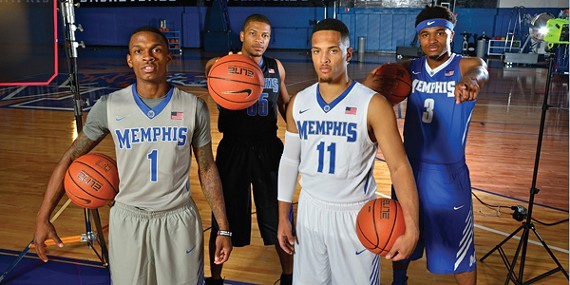
For every team, in every sport, there exists a dichotomy: what is expected of that team, and what that team actually becomes. The only exceptions are the super teams (think 1976 Cincinnati Reds, 1985 Chicago Bears, 2012-13 Miami Heat) or the extraordinarily dreadful (the 1992-93 Dallas Mavericks and the 2008 Detroit Lions come to mind). The mercurial nature of the 2013-14 Memphis Tigers made for a dichotomy as pronounced as any this proud program has experienced (suffered?) before.
There’s the team Memphians wanted to see, the team they thought coach Josh Pastner had secured this past November. A veteran (four senior guards!) core, a pair of prize recruits (Austin Nichols, Nick King), and a brand of athleticism that would ensure a frenetic offensive pace and stout, lock-down defense. And there were games in which this team did, in fact, surface. A payback win over 5th-ranked Oklahoma State in early December. An upset of 12th-ranked Louisville on the Cardinals’ floor in January. An astonishing late-game comeback against Gonzaga — with ESPN’s Game Day crew at FedExForum — in early February. When the Tigers closed their second game against Louisville (this time ranked 7th in the country) on a 15-1 run, Tiger fans collectively screamed, “Yes . . . this is our team!”
But hold on. The win over Oklahoma State was considered remarkable largely because the Cowboys had destroyed Memphis — scoring 101 points — less than two weeks earlier. As tough as the Tigers proved to be against the defending national champs, they were as soft in losing five games combined against Cincinnati and Connecticut. (You’d have to go back a few years to find a more dispiriting loss than the 19-point beat-down the Tigers took on their home floor against the Huskies in the quarterfinals of the American Athletic Conference (AAC) tournament.) And let’s not forget the loss that may have done the most damage to the Tigers’ NCAA tournament seed: February 27th at Houston. A Cougar team the Tigers beat by 23 points in January controlled the game, start to finish. Mercurial doesn’t do this Memphis team justice.
So what exactly was the group we’ll remember as the 2013-14 Tigers? Once the hurt of the season-ending loss to Virginia on Sunday begins to fade, when we’re able to pull back and examine the mosaic of a season instead of the tiny panels that made that season, we’ll likely see precisely what we got: One of the top 32 teams in the country, and no more.
There was some irony to the Tigers falling out of the Top-25 rankings on the eve of the NCAA tournament, as they’d managed to stay in those rankings the entire regular season. (The AAC tourney loss was just that ugly.) After eight years of Conference USA 2.0, Pastner led his club through a gauntlet of 11 ranked opponents, tying a program record set in 2004-05. (That team, remember, played in the NIT). Memphis beat five of those teams, and came agonizingly close to knocking off a Florida team — in Madison Square Garden — that entered the NCAA tournament as the number-one team in the country. This was a good team, just not a great one. (It was, let it be said, a poor defensive team, weak in both body and effort. Priority number one for the offseason should be strengthening. Period.)
Next season will be very different. The departure of those four senior guards — Joe Jackson, Chris Crawford, Geron Johnson, and Michael Dixon — will alter, literally, the way the Tigers play the game. Tiger fans will have to get acquainted with Markel Crawford and Pookie Powell (both redshirted this season) and newcomers Dominic Magee and Avery Woodson. Big men Shaq Goodwin and Austin Nichols will become the faces of the program, while Nick King, presumably, transitions from role player off the bench to impact scorer. They will not be ranked among the country’s top ten teams, maybe not the top 20. And they will not be favored to win the AAC. They’ll enter the season claiming to be overlooked and underappreciated, with little to lose and a new chapter in Tiger history to gain.
And they’ll likely surprise us, for good or ill. They’ll win a game they shouldn’t … and lose a game they shouldn’t. Leaving those who love Tiger basketball to wrestle, once again, with the dichotomy that makes every season worth following in the first place.